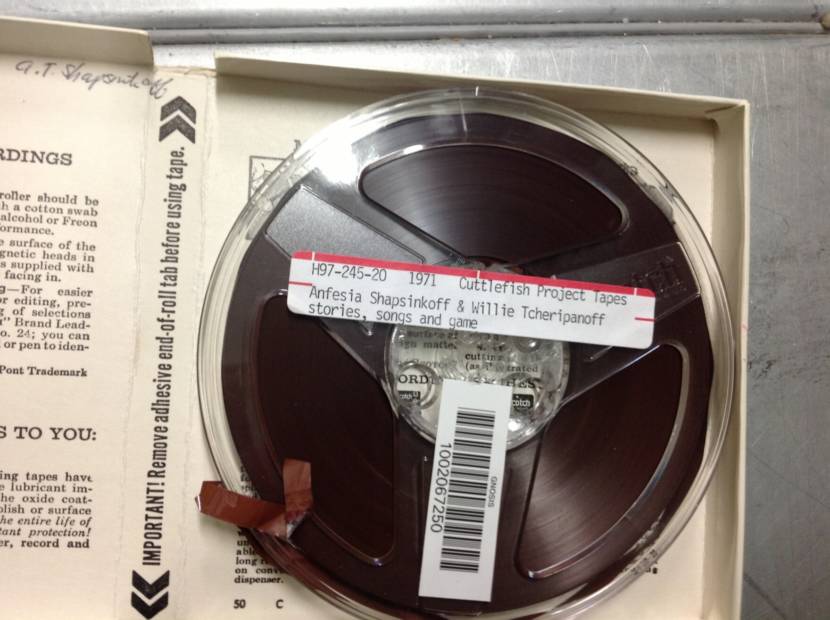
A collection of audio reels made in the Aleutian region in the 1970s was digitized and will soon be available online through the University of Alaska Fairbanks.
The recordings were part of a school project that started in 1977 when a group of Unalaska students and their teacher Ray Hudson started collecting texts about the culture, language and history of the Aleutians. They called themselves the “Cuttlefish Class” – a name they picked out together – and they called their project the “Cuttlefish Series.”
The students put together six hefty volumes meant to bring the island community and Unangax̂ culture into the classroom. They contain things like fishing stories, letters, recipes for alodics, an Unangax̂ form of fry bread, as well as memories from Makushin and the other lost villages that were forcibly evacuated during World War II.
For the most part, the book series is based on knowledge provided by Unangax̂ elders from around the region – a lot of which was documented on reel-to-reel tape.
A total of 59 audio reels were saved from the project. On them are things like teachings from elder Bill Tcheripanoff in September of 1977, who was recorded talking to Unalaska students about an ulux̂tax̂, an Unangax̂ skin-on-frame sea kayak. There are clips of friends and families playing games in their homes, as well as lists of words translated into Unangam Tunuu.
The recordings were housed at the Unalaska City School District for about two decades. In 1997, the reels were given to the University of Alaska Fairbanks and sat there for about another 20 years. But in 2020, Leslie McCartney, an associate professor and curator of the oral history collection at UAF, got a grant and started digitizing them.
“We were able to send these recordings out to a company to have them digitized in a professional manner at a sampling rate much higher than what we could do,” McCartney said.
Part of her job is to look after the library’s oral history collection, which contains over 15,000 recordings “on all kinds of different media, from wire recordings to magnetic tape to digital to video, you name it,” McCartney said.
Another part of her job is to decide which media from the collection needs to be digitized and when.
After getting the grant from the National Recording Preservation Foundation, McCartney said she asked her staff what content they had that was endangered.
“What have we got that might fit the bill?” she asked them. “And one of my staff suggested the Cuttlefish tapes, and I said, ‘Okay, well, let’s take a look at that.’”
Even after about 40 years of sitting around, she said the tapes were in pretty good condition, but she didn’t want to risk digitizing them in-house.
A lot of the recordings in UAF’s oral history collection aren’t labeled. Most of the time, McCartney and her small team have to do a lot of detective work just to find out what the originals contain – and that’s before they can even begin to digitize them.
But the Cuttlefish recordings are unique, said McCartney. That’s because Hudson – who has written extensively about Aleutian history and taught the Cuttlefish Class – still remembered many details about the recordings. So even though there wasn’t much written information available about the tapes, Hudson was able to tell McCartney who was speaking in each recording and why it was so important to preserve those voices.
“What we were really, really fortunate about was that Ray had been the one that recorded them,” McCartney said. “And I reached out to him, and he gave me absolutely tons of information about the recordings, which really helped me write the grant.”
The grant started in November of 2020. Ideally, McCartney said she and her team would have finished digitizing, cataloguing and getting the recordings online by about June, but things like the pandemic have slowed the process.
The tapes have all been digitized and are still being catalogued, meaning someone is writing and editing descriptions for each reel. McCartney says her group is also working on getting them online, but staff shortages and technical problems make it tough to say when exactly they’ll be available.
McCartney’s work will end once those recordings are online and she’s gotten word out to the community. She said she’s glad to help share these stories.
“They’re absolutely precious cultural recordings,” she said. “Not just for the people of that area, but the people of the world, for our cultures and languages everywhere.”
The Cuttlefish tapes will be available to anyone with a stable internet connection, through UAF’s online library catalog at some point in the near future.
